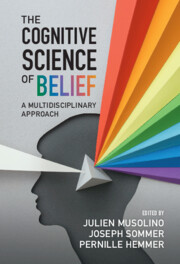Book contents
- The Cognitive Science of Belief
- The Cognitive Science of Belief
- Copyright page
- Contents
- Figures and Tables
- Contributors
- Chapter 1 Introduction
- Part I Understanding Belief
- Philosophical and Linguistic Approaches to Beliefs
- Chapter 2 The Cognitive Science of ‘Belief’ (The Word)
- Chapter 3 The Science of Belief: A Progress Report
- Chapter 4 The Role of Context in Belief Evaluation: Costs and Benefits of Irrational Beliefs
- Models of Optimal Beliefs
- Implicit vs Explicit Beliefs
- Evolutionary Psychology of Beliefs
- Part II Domains of Beliefs
- Part III Variation in Beliefs
- Index
- References
Chapter 4 - The Role of Context in Belief Evaluation: Costs and Benefits of Irrational Beliefs
from Philosophical and Linguistic Approaches to Beliefs
Published online by Cambridge University Press: 03 November 2022
- The Cognitive Science of Belief
- The Cognitive Science of Belief
- Copyright page
- Contents
- Figures and Tables
- Contributors
- Chapter 1 Introduction
- Part I Understanding Belief
- Philosophical and Linguistic Approaches to Beliefs
- Chapter 2 The Cognitive Science of ‘Belief’ (The Word)
- Chapter 3 The Science of Belief: A Progress Report
- Chapter 4 The Role of Context in Belief Evaluation: Costs and Benefits of Irrational Beliefs
- Models of Optimal Beliefs
- Implicit vs Explicit Beliefs
- Evolutionary Psychology of Beliefs
- Part II Domains of Beliefs
- Part III Variation in Beliefs
- Index
- References
Summary
Irrational beliefs are often associated with poor mental health and are seen as costly beliefs that should be eliminated or replaced when possible. Building on decades of empirical research, we argue that irrational beliefs are widespread in human cognition and not confined to people with poor mental health. Moreover, recent philosophical research has emphasized that irrational beliefs can be beneficial to the person holding them, not only psychologically but also epistemically, which suggests that in some cases elimination or replacement is not the most appropriate course of action. The problem emerging is how we decide when an agent’s irrational belief needs to be challenged: in this chapter, we point to the importance of the social context surrounding the agent by discussing one case of everyday confabulation whose effects vary across contexts.
Keywords
- Type
- Chapter
- Information
- The Cognitive Science of BeliefA Multidisciplinary Approach, pp. 92 - 110Publisher: Cambridge University PressPrint publication year: 2022
References
- 1
- Cited by



